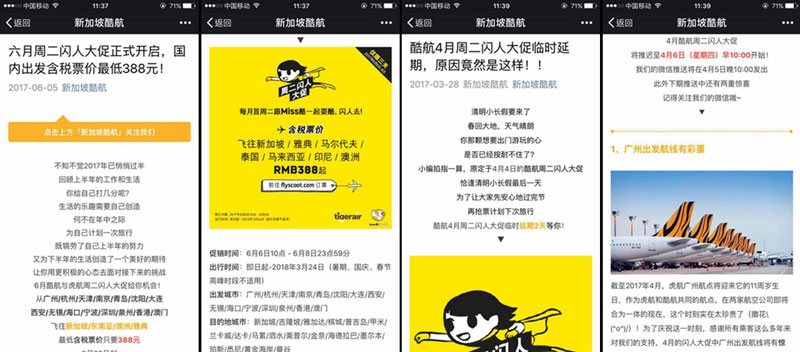Scoot, Singapore Airlines’ low-cost long-haul brand, entered the Chinese market in August 2012, and now operates flights between Singapore and seven Chinese cities, in addition to Hong Kong. Although low-cost airlines (LCCs) face many challenges in the Chinese market, Scoot has worked to stay competitive by focusing on second- and third-tier cities, offering a high-quality product, and being digitally engaged.
LCCs have found it difficult to compete in China, as national Chinese airlines offer very competitive prices and also benefit from favoritism when it comes to things like scheduling flight times. Scoot and other LCCs, therefore, have to enter and operate in the Chinese market equipped with a well thought-out strategy.
First, Scoot aims to redefine what a LCC should be, by offering many of the same amenities that Singapore Airlines is known for, but with greater choice for customers. Scoot uses Boeing 787 passenger jets, which are safe and modern, with both business and economy class, as well as on-board Wi-Fi. Customers can pay to check luggage and to order onboard refreshments. “You could enjoy a traditional Singaporean Hainan chicken rice, or tom yum goong, or not order food – this choice is in the hands of the customer,” explains Lee Yong Sin, Scoot’s General Manager, China.
To increase its competitiveness and avoid cannibalizing its own market by operating in the same places as its parent, Singapore Airlines, Scoot mainly focuses on second- and third-tier Chinese cities. This ends up complementing Singapore Airlines’ network and increasing market share for the company as a whole. “These years, the third and second tier cities’ travel needs are thriving, so Scoot is doing well in those cities, and at the same time adding volume to meet local needs,” says Lee.

Scoot Weekly Deals promoted on WeChat
From the start, Scoot has marketed itself digitally. In addition to a traditional in-house sales team, Scoot has worked together with Chinese OTA platforms including Ctrip, Qunar and Fliggy (Alibaba’s travel platform “Feizhu” in Chinese, recently rebranded from “Alitrip”) to sell tickets, continuously growing its customer base. At the same time, Scoot has used its own website, app, WeChat and Weibo accounts to promote special offers. Lee explains that from 2016, the company launched a weekly deal every Tuesday, which has done a lot for the company’s sales and reputation, and won them loyal followers on social media. For the last two years, Scoot has worked together with Dragon Trail Interactive on its digital marketing strategy, scheduling content, analyzing its customer base, encouraging customers to share their positive travel experiences on social media and, in Lee’s words, working to promote Scoot’s “young, interesting and vivacious brand attitude.”
Furthermore, Dragon Trail worked together with Scoot and the Singapore Tourism Board to put together a familiarization (FAM) tour of Singapore for six travel Key Opinion Leaders (KOLs) from the Chinese second-tier city of Xi’an. The KOLs were chosen for having prominent social media accounts, particularly popular among young people in Xi’an – this proved an effective way of marketing in one specific city. The FAM tour included food, attractions and sightseeing in places that were identified as particularly interesting for the audience at home in China.

Scoot FAM Trip to Singapore
Scoot’s experience shows that the risky market for LCCs in China can be successfully navigated with strategic marketing decisions, including focusing on smaller cities, partnering with Chinese OTAs and working together with China-based digital marketing experts to define and promote the brand to the right audience.
Sign up for our free newsletter to keep up to date on our latest news
We do not share your details with any third parties. View our privacy policy.
This website or its third party tools use cookies, which are necessary to its functioning and required to achieve the purposes illustrated in the cookie policy. If you want to know more or withdraw your consent to all or some of the cookies, please refer to the cookie policy. By closing this banner, scrolling this page, clicking a link or continuing to browse otherwise, you agree to the use of cookies.